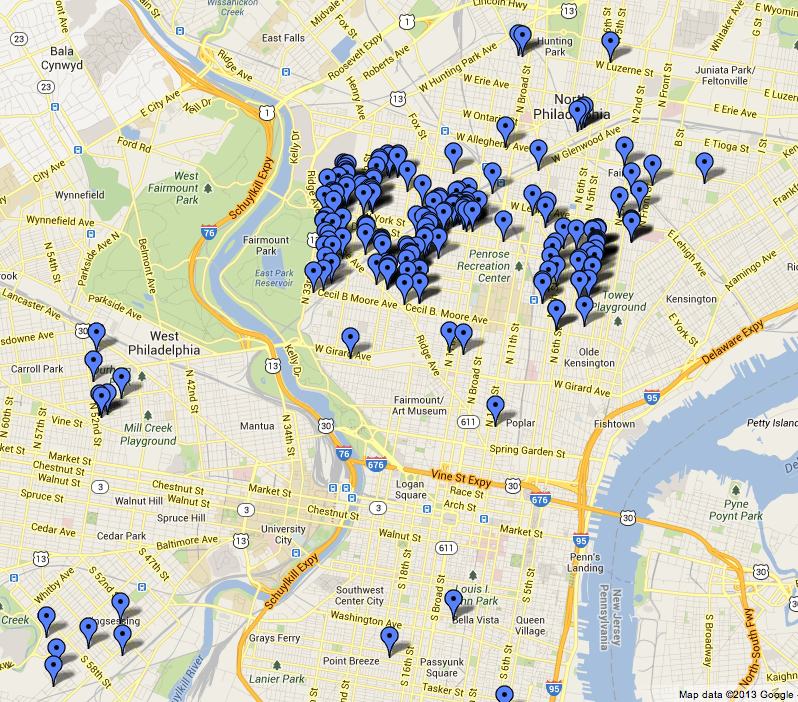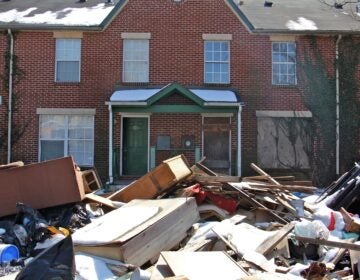How to bid at next week’s Housing Authority auction

Next week the Philadelphia Housing Authority will auction off 196 vacant homes and lots with the help of Max Spann Real Estate & Auction Company. The auction, the third of its kind, is meant to unload some of PHA’s 1,700 vacant scattered site properties, PlanPhilly’s Jared Brey reported recently.
In case you missed one of the three information sessions but still want to bid on a property, here is what you need to know.
All of the properties are in “various levels of disrepair,” and anyone looking to buy should visit the property before bidding, said Robert Dann, executive vice president and chief operations officer at Max Spann. Some sites have vacant homes. Others are empty lots. All need improvement.
A full list and map of the 196 properties is available on MaxSpann.com.
For the most part, the properties are in North Central Philadelphia, but a few are scattered throughout the rest of the city. One site is for sale in Hawthorne, another in Point Breeze and one in Pennsport. Six Kingessing properties will be sold and a handful is available in the Parkside neighborhood.
“I tell everyone to go out and see what you’re buying,” Dann said. “Don’t make decisions off the web.”
View PHA Properties Map in a larger map
How to bid and What to know
Those interested in bidding should pre-register online at MaxSpann.com and download the Property Information Package. You can look up the property size and tax information on the Office of Property Assessment website and check zoning information using phila.gov/map.
All of the properties are free and clear of back taxes and liens. No one who buys a property will be responsible for unpaid water or gas bills.
To bid at the auction, attendees must bring one $2,500 cashier’s check for each property purchased. The cashier’s check should be made payable to the bidder and will be endorsed to the escrow holder if a bid is accepted. If an auction-goer wants to bid on three properties, for instance, he or she must bring three $2,500 cashier’s checks.
Each bidder must also bring a personal check to pay the balance of a 10 percent deposit of the contract price. Only one personal check is required per bidder.
A buyer’s premium – 10 percent of the bid price or $200, whichever is greater – will be added to the bid price to create the final contract price. So if a winning bid is $16,000, 10 percent ($1,600) will be added to create the final contract price, $17,600.
The auction will take place Tuesday, July 16 at 10 a.m. at the First District Plaza, 3801 Market Street, Philadelphia, PA 19104. Dann recommends that attendees arrive by 9:30 a.m.
So far roughly 50 people have attended each of the three information sessions hosted by Max Spann, Dann said.
Five years to improve the property
The one stipulation is the reversionary clause, which requires the new property owner to improve the vacant home or lot in some way within five years of the purchase. If an improvement is not made, PHA has the right to repossess the property.
That stipulation may be more relaxed than intended. Dann said simply cleaning a lot or sealing the windows on a vacant home could qualify as an improvement, and once one improvement is made, the reversionary clause is satisfied. In addition, since the first two scattered site property auctions in 2011, Dann said, PHA has not been policing the requirement.
“I don’t expect them to police this, but if your neighbor calls and says, ‘The roof is falling off. It’s unsafe,’ PHA is gonna call you and say, ‘We’re gonna take it away,” Dann said.
If the property is sold within five years, the new owner will be responsible for making improvements.
Third times the charm
PHA conducted similar property auctions in November and December 2011. The first auction caused a stir because most of the 400 properties that were auctioned were bundled in packages ranging from two to 25 properties. Philadelphia residents who lived near the properties felt that the bundling strategy catered to large-scale developers and barred local residents from bidding on individual properties.
More than 700 people attended that first auction, which earned PHA around $6.4 million. In December 2011, PHA held a second auction in which they sold 100 properties. None of those 100 properties were bundled, and at the second auction, individual properties sold for between $9,000 and $320,000.
PHA hopes the auction next will raise $3 to $4 million, which the Authority will put towards its operating budget, Brey reported.
WHYY is your source for fact-based, in-depth journalism and information. As a nonprofit organization, we rely on financial support from readers like you. Please give today.






